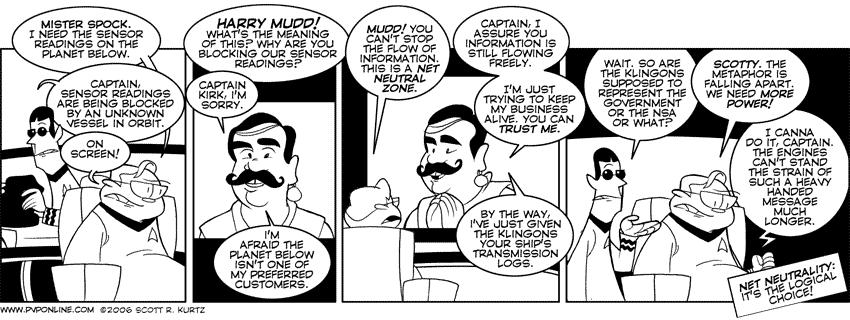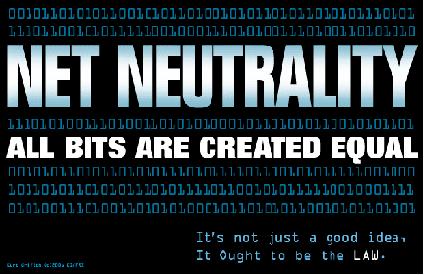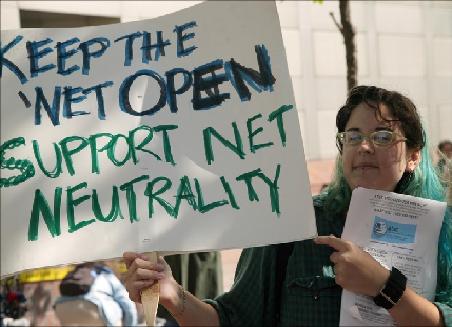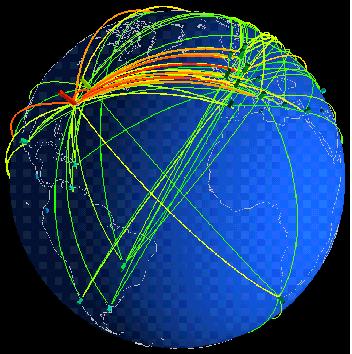Courses/Computer Science/CPSC 203/CPSC 203 2007Summer L60/CPSC 203 2007Summer L60 TermProjects/What in the world is Net Neurtality??
Contents
What in the World is Net Neutrality??
By F4 (Flower 4)
Group members: Kowther Hassan, Fatima Sarhan, Rosita Wong, Tyler Smith
Initial Project Statement
Net Neutrality is the principle that Internet users should be in control of what they view and what applications they use on the Internet. Yet, there is a possibility of broadband carriers controlling what people see and do online. In our arguement,our group F4, will address this issue by looking at the effects of search technology and net neutrality as it has on our lives through politics, business, free speech and the Internet structure although we have agreed upon the implications of pro-net netrality as being what we value for the future of the internet.
Net Neutrality
What is Net Neutrality?
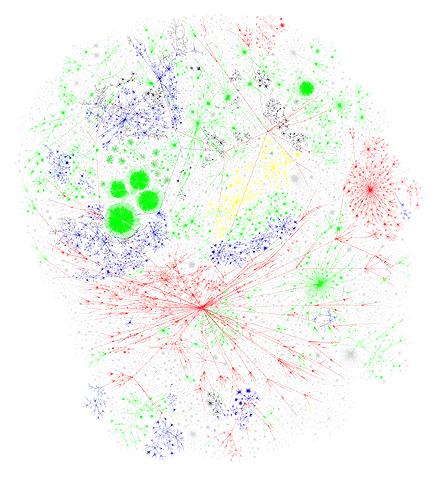
As stated in the Initial Project Statement Net Neutrality is the principle that Internet users should be in control of what they view and what applications they use on the Internet. The issue of control has been around since the telegraph was invented but the term “Net Neutrality is a relatively recent term that is used in association with the internet. The term was coined by Tim Wu who also popularized the principle.
Net Neutrality and ...
...Internet Stucture
The internet is a “network of networks” that connects many computers together. What this means is a vast number of small networks are connected together to make up the internet. The internet uses a standard protocol called the Internet Protocol (IP) to transmit information via websites, email, the World Wide Web, etc to many computers around the world. To connect to the internet, internet service providers (ISPs) are needed. The ISPs are broken up into 3 tiers. Tier 1 ISPs are the largest providers and they move large amounts of information at a fast speed. Tier 2 ISPs are regional providers that service large regions. Tier 3 ISPs are local providers. Every tier 2 is connected to a tier 1 and every tier 3 is connected to a tier 2. The speed of connectivity gets weaker as it moves through tiers. No person or organization owns the internet. This allows any individual to access any information they want on the internet. This is the principle of net neutrality. The problem that has surfaced is that local ISPs are trying to take control of the internet which they don’t currently have. The internet operates on a scale free network. If net neutrality were to be abolished, the internet’s scale free network would be susceptible to major manipulations. The ISPs would choose which websites were to be accessed. The websites that the ISPs choose would then become the high connectivity hubs. For example, if you search for anything on a particular search engine only certain websites that are associated with the ISP would appear, those websites would then become the hubs with high connectivity. Websites that were previously very popular would become increasingly insignificant. If one of the hubs were to be attacked the website would be inaccessible, there would be an even smaller choice of available websites. For more examples of the internet sans neutrality go to this website: http://whatisnetneutrality.ca/en/node/5.
...Free Speech
Mass communication includes telephone, cell phone, fax, radio, television,
newspaper, magazines, e-mail, text messages and internet. We should be able to access, post and use any applications with no restrictions or no limitations. In our global society, mass communication plays a very important part in our daily life. Internet neutrality is a principle right, and it is a challenging issue to resolve.“Net Neutrality is freedom of Speech…[and] freedom of digital expression.” This principle will affect our communication today and in the future. We should protect the future of the Canadian Internet which is being debated by government. But, on the other hand, we should not limit the customers’ choices.
(http://www.opednews.com/articles/opedne_robert_r_061023_net_neutrality_under.htm)
Restoring Long-Standing Net Neutrality Protections Massive innovation on the Internet since its creation is in part the result of pre-2005 Net Neutrality protections. Starting nearly forty years ago, the Federal Communications Commission (FCC) concluded that under Title II of the Communications Act, telephone companies and network owners were prohibited from interfering with or discriminating against "telecommunications services" offering computer network access. The availability of common carrier telephone networks to independent equipment manufacturers and Internet Service . Providers (ISPs) led to the Internet's birth. Entrepreneurs freely developed pioneering services and products resulting in a technological revolution driving our nation's economic growth in the last decade. (http://www.aclu.org/freespeech/internet/26828res20060922.html)
...Business
Net Neutrality is a way to prevent centralized control over the future of the internet yet the argument facing net neutrality is should consumers reach all of the internet content equally or should the cable and phone companies decide where you should go or see depending on how much money they will make, for example, what if Telus made it slower and harder to reach Gmail and quicker and easier to reach Hotmail? The phone and cable companies argue that they will not block websites but instead charge companies a fee for priority service. There are many critics who are against this idea because it is seen as an unfair tactic towards the consumer and a form of discrimination. The fear of not enforcing net neutrality is that it will affect the market to the point where there is a lack of innovation and an increase in deal making between business companies seeking to dominate and strengthen their market share.
According to The Canadian Press… “Big content providers like Google, Yahoo and Microsoft are dead set against scrapping Net neutrality, saying it would destroy the free and open nature of the Internet and also create a tiered, dollar-driven Net that favors the wealthiest corporations over everyone else. But the telecom giants, here and in the U.S., argue that controlling data transmissions over the Internet would allow them to ensure quality of service and to encourage investment in broadband networks.
From the pro-Net neutrality site Save the Internet, here's how an absence of Net neutrality legislation could affect everyday consumers:
'Google users -' Another search engine could pay telecom companies to guarantee that it opens faster than Google on your computer.
Innovators with the "next big idea"-Startups and entrepreneurs will be muscled out of the marketplace by big corporations that pay Internet providers for dominant placing on the web. The little guy will be left in the "slow lane" with inferior Internet service, unable to compete.
'iPod listeners -' Companies could slow access to iTunes, steering you to higher-priced music services that they own.
Online shoppers - Companies could pay Internet providers to guarantee their online sales process faster than their competitors with lower prices.
Small businesses - When Internet service providers favors their own services, you won't be able to choose more affordable providers for online video, teleconferencing, Internet phone calls, and software that connects your home computer to your office.
Bloggers - Costs will skyrocket to post and share video and audio clips, silencing citizen journalists and putting more power in the hands of a few corporate-owned media outlets.”
Source: savetheinternet.com
The debate on net neutrality is still in process and the future of the internet is at stake. In order to have a striving and fair network there should be a level playing field without discrimination, blocked sites, or choosing favorites. Instead, allow for the network to grow and expand by giving the consumer a choice therefore allowing net neutrality to thrive.
...Politics
The current debate on the political stage is more dominant in the United States than in Canada. Considering the interconnectedness in media between Canada and the US, we must pay close attention to the American approach to this issue. The documents found with respect to Canadian regulation of the internet are largely speculative, and do not reference any members of the current government. Net neutrality is gaining recognition as a buzz word for internet regulation in general, and thus is often being mislabelled in political circles. The danger of this is that it becomes an easy straw man debate for parties on both sides of the internet regulation debate. Currently the Canadian government is suggesting a free market for the internet, but no plan or policy has been overtly stated. Net neutrality has reached the advanced stages of American policy making, and currently pro-regulation is leading the legislation. This in effect means that there will be harsh penalties for ISP’s who attempt to filter the exchange of information based on money. Canada is still far behind in its legislation, and law makers here have the classic Canadian attitude of, learn from the American model before doing anything on our own.
Opposing Teams
Organizations and People For Net Neutrality
Tim Berners-Lee
Microsoft
Consumers Union
American Library Association,
Organizations and People Against Net Neutrality
Internet Service Providers such as Verizon and AT&T
Robert Pepper
Bob Kahn
Dave Farber
Michael Katz
Chris Yoo
Hands Off The Internet is a blog wesite that these people use to voice their opinions about net neutrality.
External References
Internet Structure...
1. http://www.computerengineering.ca/about_Internet/Internet_structure
2. http://lxer.com/module/newswire/view/53907/
3. http://en.wikipedia.org/wiki/Network_neutrality
4. http://www.aclu.org/cyberliberties/general/25334leg20060425.html
5. http://www.savetheinternet.com/
6. http://www.publicknowledge.org/node/497
7. http://www.savetheinternet.com/
9. http://www.cbc.ca/consumer/story/2006/11/02/tech-neutrality.html
Free Speech...
1. http://www.opednews.com/articles/opedne_robert_r_061023_net_neutrality_under.htm
2. http://www.onlyrepublican.com/orinsf/2006/03/taking_sides_on.html
3. http://www.hyperorg.com/blogger/mtarchive/why_net_neutrality_matters.html
4. http://elgg.net/bwerdmuller/weblog/28294.html
5. http://www.ncta.com/IssueBrief.aspx?contentId=2715
6. http://news.yahoo.com/s/pcworld/20070717/tc_pcworld/134632
7. http://www.tom-muck.com/blog/index.cfm?newsid=150
8. http://www.tom-muck.com/blog/index.cfm?newsid=150
9. http://www.change.org/changes/change_page/10
10. http://blog.tmcnet.com/regulations/net-neutrality/net-neutrality.asp
Business...
1. http://www.phoenix-center.org/CommEntNetworkNeutrality.pdf
2. http://www.slate.com/id/2140850/
3. http://www.smartmobs.com/2007/07/13/business-week-on-net-neutrality/
4. http://www.cbc.ca/cp/business/070206/b0206149A.html
5. http://www.freedomworks.org/informed/issues_template.php?issue_id=2851
6. http://www.cbronline.com/article_news.asp?guid=CFE94B01-21A0-4C11-8B49-EF044525DA25
7. http://networks.silicon.com/webwatch/0,39024667,39158962,00.htm
8. http://handsoff.org/hoti_docs/studies/FreedomWorks_Study_61907.pdf
9. http://www.cio.com/article/124151/Hundreds_Weigh_In_On_Net_Neutrality
10. http://www.bruderly.com/pdf/telecom-giants-threaten-net-neutrality_thebusinessjournal.pdf
11. http://wyden.senate.gov/media/photos/102006%20Net%20Neutrality/mainpage.htm
Politics...
1. http://www.troyangrignon.com
2. http://www.thestar.com/article/180608
3. http://www.cbc.ca/cp/business/070206/b0206149A.html
4. http://www.canada.com/nationalpost/financialpost/
5. http://www.whatisnetneutrality.ca/en
6. http://www.google.com/help/netneutrality_letter.html
7. http://news.com.com/Net+neutrality+proposal+revived+in+Senate/2100-1028_3-6148751.html
8. http://www.youtube.com/watch?v=l9jHOn0EW8U

